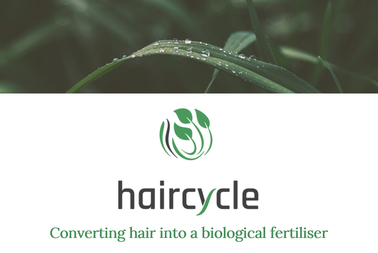Belgian finalists in EU bio-based student challenge need your hair
(20-10-2020) Haircycle, a team of students from Ghent University, was the Belgian representative at the EU final of the Bio-based Innovation Student Challenge (BISC-E).
Did you ever wonder what happens to your hair once the hairdresser is done with giving you a fancy cut? It gets incinerated, just as any other non-recyclable waste. Haircycle wants to convert this waste into a useful bio-based fertiliser to grow plants. This team of students turned their idea into a business case and thanks to the coaching of the GREEN-CHEM network, they reached the final of the Bio-based Innovation Student Challenge-Europe (BISC-E). Next, they are starting with a regional pilot project with local hairdressers, to prove the techno-economic feasibility and the sustainability of their solution.
In a challenging year, such as 2020, bringing together a motivated and multidisciplinary team of students to develop an innovative bio-based market solution is hard. To also analyse the business case and its environmental impact and to pitch this in front of a jury of international experts, sounds like an impossible mission. But that is exactly what Haircycle, a team of students from Ghent University students, did as Belgian finalists in the EU BISC-E which took place in October.
“Getting ready for the EU finals was a bit challenging, but we are glad that we made it and were able to present our ideas about our bio-based fertiliser extracted from hair waste”, says Nicolas Decrêm, who is the founder and team leader of Haircycle. “We are an excellent example of interdisciplinary cooperation between students, as I am an economist, but I had to team up with a group of students from the chemistry department to turn this idea into reality.”
But how does it work exactly? “Hair is made up of keratin, which, as any other protein, has amino acids as building blocks. Once the amino acids are extracted from the hair, these can be used as biostimulants in plant growth and to increase crop yield. This means that the nutrients we have ingested as food and that contributed to the growth of our hair can return to the soil, facilitating the delivery of minerals to plants”. Nicolas continues: “Once we will scale-up our idea and bring it effectively to market, every time you will get a haircut you will be actually contributing to growing new plants and crops. For example, to grow juicer and healthier tomatoes, cucumbers, etc.”
“True, we did not win the finals”, Nicolas admits, as the prize was awarded to the Citrion team from Greece for valorizing citrus waste. “But this experience was just the starting point of our journey. In fact, as soon as regulation allows, we want to partner up with some hairdressers from the Ghent region to start a pilot project. And we will take with us everything we have learned so far in the BISC-E adventure, to improve our ideas and business model”.
Are you or do you know an interested hairdresser or a potential hair donor? Or are you just curious to follow up with the journey of the Haircycle pioneers in the world of bio-based fertilisers? Check out their website: Green Circle Salons
The Bio-based Industries Consortium (BIC) promotes this student initiative since 2017, and it keeps growing every year, as representatives from six EU member countries (Belgium, Finland, Greece, the Netherlands, Portugal and Spain) competed in the 2020 online edition. “BISC-E facilitates breakthrough innovation in the bio-based sector via this annual competition between some of Europe’s most promising university students” says prof. Erik Meers from the Faculty of Bioscience Engineering, who was the first one to encourage this group of students to pursue their ideas. “For our network, contributing to the growth of these students is a crucial step into bringing green chemistry into action. We are also very grateful to the ‘Expedition Do’ program, which supports students towards their entrepreneurial goals and helps them to get started. We are looking forward to interact with more student teams in the coming years of the Belgian BISC-E competition”.
Hopefully the story of Haircycle will inspire even more students and more countries to participate to the next edition of this European competition. Of course, we are here to help: if you want to start your own national bio-based innovation student competition and/or have a team of students working on relevant projects, you can contact: info.greenchem@ugent.be.
